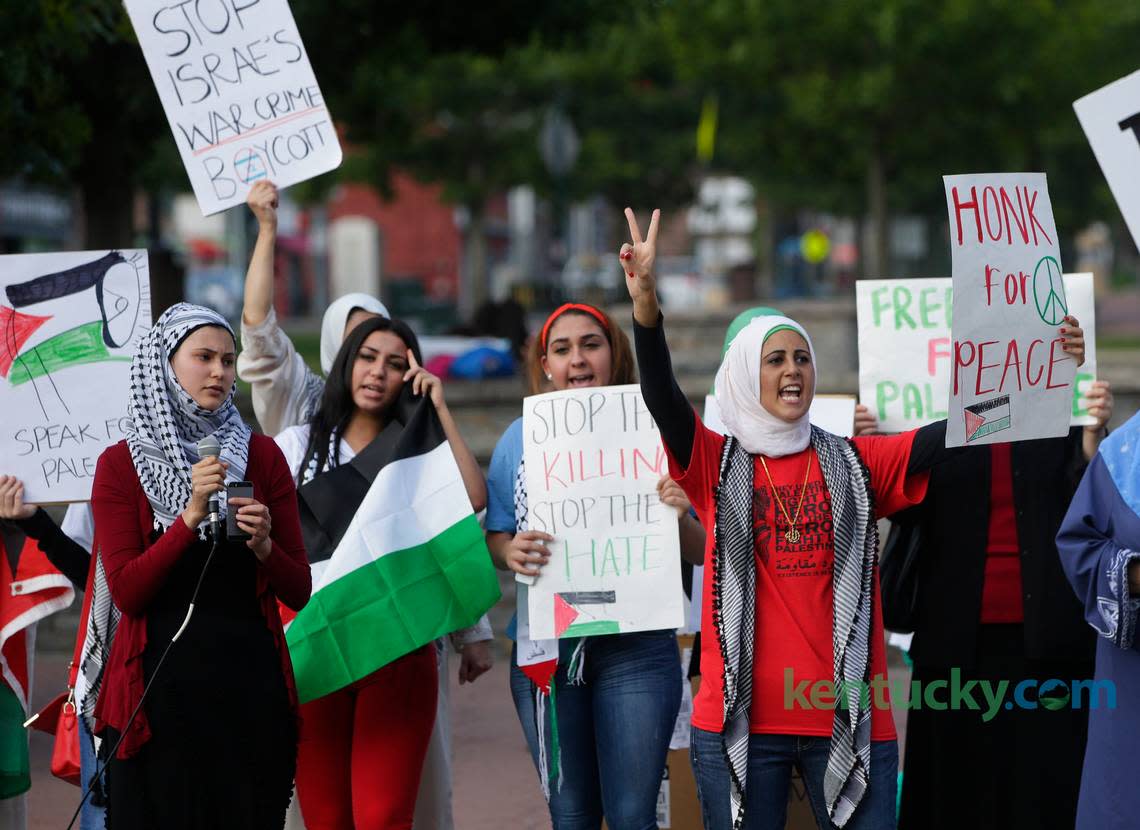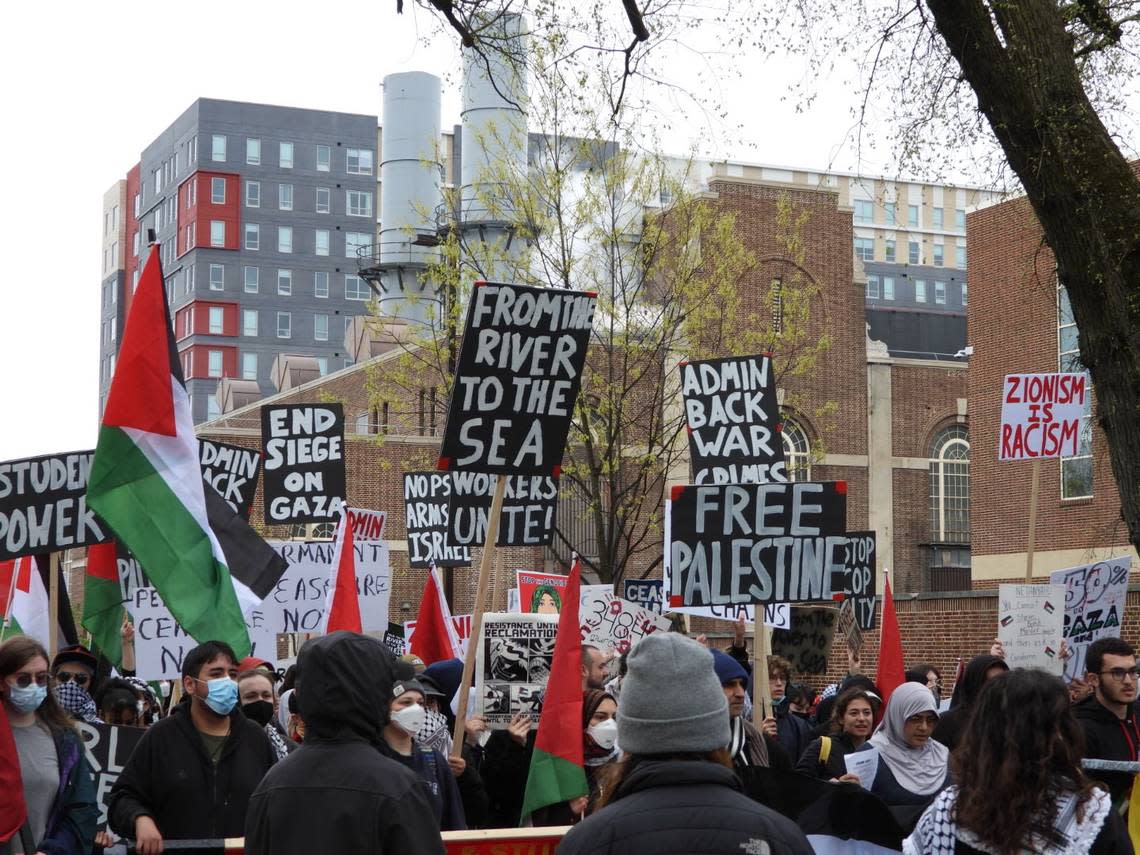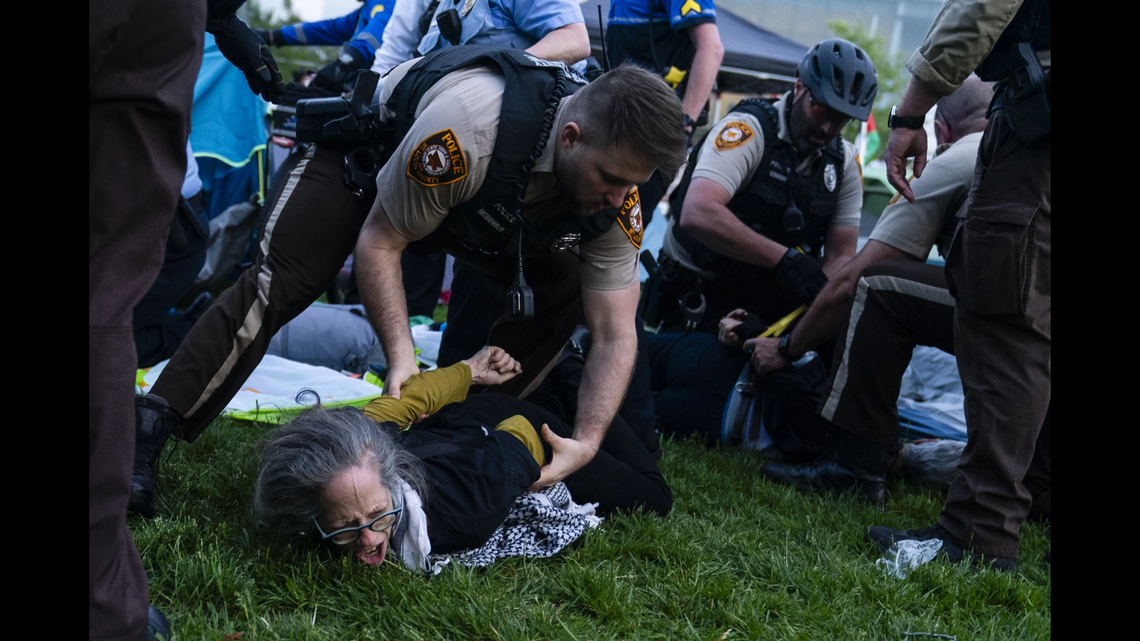Pro-Palestine protests have popped up at universities across the nation: UK is next
Following suit with other colleges around the country, pro-Palestine protesters Wednesday will make their voices heard at the University of Kentucky.
There will be a rally for Gaza, a Palestine city ravaged by conflict, on the lawn of UK’s William T. Young Library Wednesday, promoted by local civic group Lex4Palestine.
“Outdoor spaces on UK’s campus are designated public forums by law, meaning community members may demonstrate in public areas so long as they don’t interrupt classes, prevent access to buildings and infrastructure or pose a direct threat to the safety of others,” UK spokesperson Kristi Willett said Tuesday.
“We do impose reasonable time, place and manner restrictions, including restrictions around amplified sound to limit disturbances to classes and other campus activities.”
Police will be at the protest “to ensure the safety of all involved,” Willett said.
An advertisement for the protest, posted by organizers, reminded demonstrators to remain peaceful.

The protest comes seven months after a Palestinian militant group, Hamas, launched an attack on Israel, which has returned fire and launched an invasion of the Gaza strip. The war has claimed more than 34,000 lives, many of whom are civilians, international medical and relief organizations have estimated.
Protesters at universities around the country have faced harsh response from school administration, including arrests and threat of suspension.
Israel-Hamas war protests at universities
Students at universities, big and small, have protested the humanitarian crisis, Israel’s military response and support from the U.S. for Israel.
In New York City, in the early morning hours of April 17, hundreds of Columbia University students started camping out to protest the school’s financial support of companies with ties to Israel. University President Minouche Shafik authorized police onto campus less than two days after the encampment started.
The New York Police Department took 108 people into custody. A new group of protesters entered the encampment, and demonstrations continued.
“If you join us, you must understand that there is a risk of arrest and academic discipline. The University thinks, Minouche Shafik thinks, that they can scare us, that they can censor us into silence. But every day we come back because the more they try to silence us, the louder we will be,” Columbia student and protester Catherine Elias told the school’s student newspaper.
Almost two weeks later, protests continue on Columbia’s campus. The administration issued a statement Monday telling protesters to disperse by 2 p.m. or face suspension. Many protesters still remain.

At the University of Texas, police used pepper spray and flash bang explosives to disperse a pro-Palestine encampment, much like the one at Columbia. Texas Gov. Greg Abbott deployed the department of public safety to “prevent any unlawful assembly.”
Police have arrested 136 people in connection to those protests, according to the Washington Post. Before the arrests, the university police department issued a statement that said protesters were in violation of multiple laws, including disorderly conduct and criminal trespassing.
At Ohio State University, police arrested 36 people April 26 for violating university rules during a protest. University spokesperson Ben Johnson told a local news outlet camping and overnight events are against university rules.

He said protesters assembled for hours before being told to disperse.
Protest rules at UK
A section of UK’s administrative regulations, the rules that govern the university, outline rules protesters should follow if on campus.
“Demonstrations may not disrupt classes, use amplified sound, block building entrances or include threats, violence or incite unlawful activity,” Willett said. “Additionally, students have rights and responsibilities outlined in the Code of Student Conduct. We often communicate rights and rules to participants at a demonstration.”
Protesters cannot block pedestrian or motor traffic, be in grass areas directly adjacent to parking lots or on UK’s medical campus. The lawn of William T. Young Library doesn’t violate any of the restricted areas defined in the regulation.
The regulations also outline when speech can be limited by the university. If a demonstration is held between 7 p.m. and 7 a.m., protests are limited to the areas of campus approved by the Vice President for Student Success and must have a reservation.
The pro-Palestine demonstration is set to start at 5 p.m.
Failure to comply with the regulations may result in student code of conduct or other violations, according to the rule. The Vice President for Student Success is in charge of enforcing the administrative regulations.
People who don’t comply with university rules “may be found in violation of the law if so determined by a law enforcement official on the scene,” the regulation said.
Willett said First Amendment rights are broad, and UK gives everyone a space to exercise their rights, as long as critical functions of the university are not disrupted.
“Our goal here, as always, is to protect free speech and assembly while also ensuring the safety and well being of our campus,” she said.
Officials with Lex4Palestine did not respond to request for comment.
